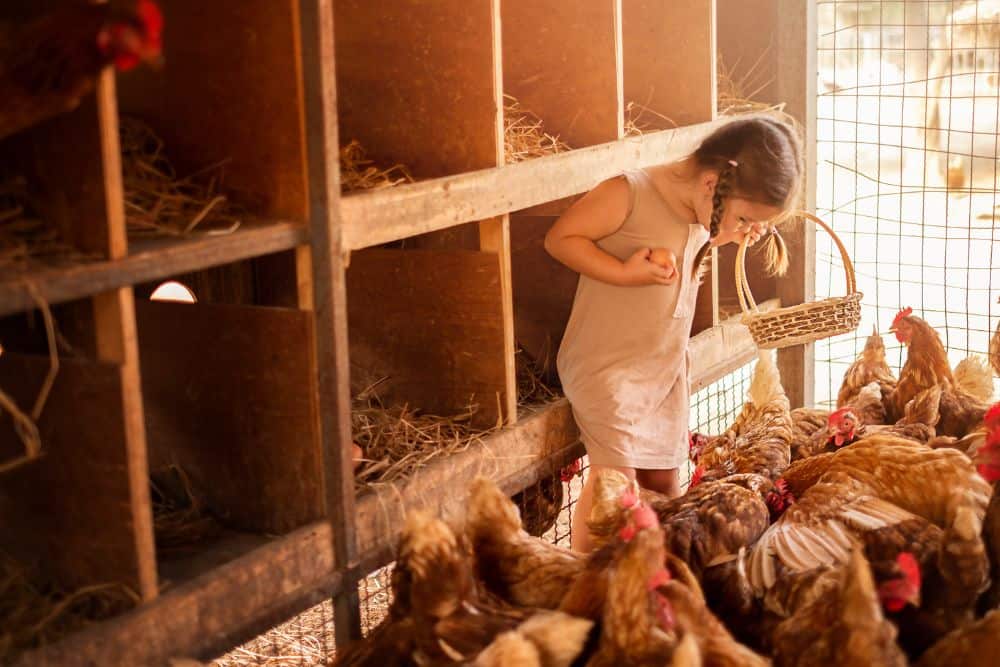You’ve probably heard the old wives’ tale that you need a rooster for hens to lay eggs. But is it true? Do you really need a rooster for hens to lay eggs for human consumption? The answer is no—most hens at their peak and given the right conditions will lay eggs on a daily basis with or without a rooster. If you’re looking to produce fertilized eggs for the purpose of hatching, then a rooster is needed. Here’s a closer look at why this is the case.
Hens Will Lay Eggs Without a Rooster
First, let’s dispel the myth that you need a rooster for hens to lay eggs. This simply isn’t true—hens will lay eggs without a rooster present. In fact, most commercial egg-laying operations don’t use roosters at all since they serve no purpose other than fertilization (more on that in a minute). So, if you’re looking to get started with backyard chicken-keeping and don’t want to deal with a noisy rooster, rest assured that your hens will still lay plenty of eggs!
Hens and Roosters
Hens are female chickens, and roosters are male chickens. Both are members of the poultry family, which includes ducks, geese, and turkeys. Chickens are omnivores and will eat just about anything, but they prefer seeds, insects, and other small animals.
Chickens are social creatures and enjoy being part of a flock. In the wild, chickens live in flocks of 10-30 birds. A flock provides safety in numbers, as there are more eyes to watch for predators and more bodies to generate heat in cold weather. Chickens also communicate with one another through body language and vocalizations.
Egg Laying
Chickens typically start laying eggs when they’re around 6 months old. Egg production will vary based on the breed of chicken, with some breeds laying more eggs than others. For example, Rhode Island Reds are known for being good egg layers and can lay up to 280 eggs per year!
Most hens will lay an egg every 26 hours or so, though this can vary depending on the time of year and other factors such as stress levels or changes in diet. When conditions are ideal (plenty of food, water, and daylight), hens can lay an egg every 24 hours.
Hens do not need a rooster present to lay eggs. However, if you want your eggs to be fertilized so that they can be used for hatching chicks, then you will need to have a rooster as part of your flock. This is because it takes both a hen and a rooster to produce fertilized eggs – the rooster’s job is to provide the sperm that fertilizes the hen’s egg before it’s laid.
You Need a Rooster if You Want Fertilized Eggs
While you don’t need a rooster for hens to lay eggs, you do need one if you want those eggs to be fertilized. This is because only male chickens (i.e., roosters) have the necessary reproductive organs to fertilize an egg. So, if you want to hatch baby chicks from your backyard flock, you’ll need to have at least one rooster on hand.
Hens That Lay Eggs Without a Rooster
Several chicken breeds are known for being good layers of eggs, even without the presence of a rooster. Some of the most popular egg-laying chicken breeds include the Rhode Island Red, White Leghorn, Australorp, and Orpington. These chicken breeds are typically considered “dual-purpose” chickens because they can be used for both egg production and meat production.
If you’re looking to add some chickens to your backyard flock solely for egg production, then these are some of the best chicken breeds to consider. With proper care and nutrition, these chickens can lay upwards of 200 eggs per year! That’s more than enough fresh eggs for the average family.
How Do Chickens Lay Eggs Without a Rooster?
Chickens are amazing creatures. Not only do they provide us with delicious eggs, but they also do it without the need for a rooster! Most healthy chickens( given the right conditions) will lay an egg almost every day, whether there’s a rooster present or not. So, how do they do it?
Hormones and Light
A big part of how chickens lay eggs has to do with hormones and light. Chickens are highly sensitive to changes in the amount of daylight they receive. In the wild, this is helpful because it allows them to know when winter is coming, and they need to start storing up food. For chickens that are kept as pets or for egg production, this means that we need to give them extra light in the winter so that they will continue to lay eggs.
The hormone that controls a chicken’s laying cycle is called prolactin. This hormone is released in response to changes in the amount of daylight. When there is more daylight, prolactin levels increase, and this triggers the chicken’s body to start producing eggs.
Egg Production
The process of a chicken laying an egg is actually quite fascinating. It starts with the hen’s ovaries releasing an immature egg into one of her oviducts( these are tubes that lead from her ovaries to her vent, where the egg will eventually exit).
Once the egg enters the oviduct, it has about 24-26 hours to travel down the tube and be fertilized by a rooster’s sperm ( if one is present). If there is no rooster present, or if the hen is not sexually mature, the egg will not be fertilized and will not develop into a chick.
As the egg travels down the oviduct, it passes through different chambers where it receives layers of the outer membrane and calcium carbonate for strength and pigmentation. Once all of these layers have been added, the egg is ready to be laid!
Do Hens Lay Better With a Rooster Around?
The simple answer is no, hens do not lay better with a rooster around. In fact, most backyard chicken enthusiasts will tell you that having a rooster is more trouble than it’s worth. So, why do people keep roosters if they don’t serve any real purpose? Well, there are a few reasons.
First and foremost, many people believe that having a rooster adds to the overall aesthetic of their flock. A brightly plumed rooster strutting around the yard can be quite a sight to behold. Secondly, some people believe that roosters help to protect the hens from predators. While this may be true to some extent, it’s important to remember that roosters are not immune to predation themselves. In fact, many backyard chicken enthusiasts have lost their prized roosters to hawks, coyotes, and other predators.
Lastly, some people keep roosters because they enjoy the sound of their crow. There’s no denying that a good morning crow can be quite soothing (or annoying, depending on who you ask). However, it’s important to remember that not all roosters crow. In fact, many breeds of chicken have been bred specifically for their silence. So, if you’re looking for a quiet flock, adding a rooster is not going to help you achieve that goal.
What are Fertilized Chicken Eggs?
Fertilized chicken eggs are those that have been laid by a hen that has mated with a rooster. During mating, the rooster will transfer sperm to the hen’s oviduct, where it will fertilize the eggs as they travel down to the vent (the opening of the cloaca, through which wastes and eggs are expelled).
As the egg moves through the hen’s reproductive tract, the outer shell forms around the inner albumen (egg white) and yolk. About 24 hours after being laid, the egg will be fully formed and ready to be laid.
How Can You Tell if Chicken Eggs Are Fertilized?
You can identify if an egg has been fertilized by looking at the yolk of the egg. If there is a white circle which looks like a bulls-eye, then it’s fertilized. This circle is called the Germinal Disc and is where cells start to multiply to form an embryo.
If you candled your eggs (held them up to bright light) before incubating them, you may have noticed this disc already. However, if you didn’t candle them, don’t worry – you can still tell if they’re fertilized by looking for this disc after they’ve been incubating for 7-10 days.
Can You Eat Fertilized Chicken Eggs?
It’s perfectly safe to eat fertilized eggs that have been stored in a cool place or at room temperature. Other than a small circle in the yolk, you won’t notice any difference when it comes to using the eggs. In fact, many people believe that fertilized eggs taste better and have more nutrients than non-fertilized ones.
Why You Might Want a Rooster
While you don’t need a rooster for your hens to lay eggs, there are some benefits to having one as part of your flock. For starters, roosters are excellent watchdogs and will sound the alarm if they sense any danger lurking around your property. This can help deter predators from attacking your flock.
Another benefit of having a rooster is that it helps keep the pecking order in check. Chickens can be aggressive with each other, and sometimes this aggression can lead to injury or even death. Having a rooster around helps keep the peace by establishing himself as the alpha chicken in the flock.
In Conclusion
In conclusion, while you don’t need a rooster for hens to lay eggs, you will need one if you want those eggs to be fertilized. Most commercial egg-laying operations don’t use roosters at all since they serve no purpose other than fertilization. So, if you’re looking to get started with backyard chicken-keeping and don’t want to deal with a noisy rooster, rest assured that your hens will still lay plenty of eggs!

